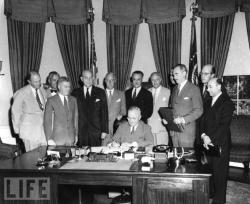
From Harry S. Truman, the American Presidency Project: I have just signed the Mutual Defense Assistance Act of 1949. This is a notable contribution to the collective security of the free nations of the world. It is one of the many steps we are taking with other free peoples to strengthen our common defense in furtherance of the principles of international peace and order enshrined in the Charter of the United Nations. . . .
Recent developments in the field of armaments have strengthened the free nations in their adherence to the principle of a common defense–the principle that underlies this act. By emphasizing the common determination of free nations to protect themselves against the threat or fear of aggression, the Mutual Defense Assistance Act will . strengthen the peace of the world.
Excerpts from statement by President Harry S. Truman upon signing the Mutual Defense Assistance Act, October 6, 1949.
From Harry S. Truman, the Truman Library, Congress passed the Mutual Defense Assistance Act of 1949 on October 6, 1949. Under its provisions I am authorized to furnish military assistance to certain foreign countries which meet the specific conditions prescribed in the law. In the case of parties to the North Atlantic Treaty, three such conditions are imposed. In the first place, to be eligible for assistance, the country must have requested such assistance prior to the effective date of the law. Secondly, $900 million of the $1 billion in funds and contract authority made available for assistance in the North Atlantic area can only be utilized after I approve recommendations for an integrated defense of the North Atlantic area made by the Council and the Defense Committee established under the North Atlantic Treaty. Finally, as a condition precedent to the furnishing of assistance to any country, the recipient must have entered into an agreement with the United States embodying certain commitments concerning its use. . . .
The North Atlantic Defense Committee, at its meeting in Paris on December 1, 1949, agreed unanimously on recommendations made by the Military Committee for the integrated defense of the North Atlantic area, and the North Atlantic Council unanimously approved these recommendations on January 6, 1950. Subsequently, the Secretary of State and the Secretary of Defense recommended that I approve them.
I have today approved these recommendations as satisfying the pertinent provisions of the Mutual Defense Assistance Act of 1949.
I have approved them because I am satisfied that they provide for the accomplishment of an integrated defense of the North Atlantic area. They do this by providing for a common defense based on the cooperative use of national military resources and on individual national specialization. They contain agreement that these resources, including United States military assistance, will be used with maximum efficiency and will not be used to develop separate and unrelated defenses.
The North Atlantic Treaty is, in itself, a deterrent to aggression. I believe that these recommendations which have been agreed to by the governments of the North Atlantic Treaty nations constitute a major achievement under the treaty. They provide further convincing evidence of the determination of these nations to resist aggression against any of them and are a definite indication of the genuine spirit of cooperation among the treaty members. . . .
These developments are the result of close cooperation among free nations which intend to remain free. They are, of course, first steps. The successful implementation of the North Atlantic Treaty will require constant and continuing effort and cooperation by all its members. Planning for defense cannot be static. It must be constantly reviewed and revised in the light of changing circumstances and it must be flexible to allow for maximum coordination of effort at all times.
Excerpts from statement by President Harry S. Truman upon issuing order providing for the administration of the Mutual Defense Assistance Act. (photo: LIFE)
Image: life%2010%206%2011%20Truman%20signs%20North%20Atlantic%20Treaty.warsawbiopic.jpg
